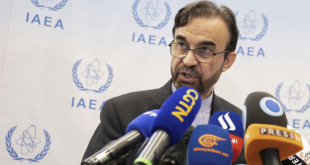 TEHRAN (FNA)- The Israeli president said exercising a military option against Iran’s nuclear program would be an error, but meantime stressed that Tel Aviv is prepared for war with Tehran.
TEHRAN (FNA)- The Israeli president said exercising a military option against Iran’s nuclear program would be an error, but meantime stressed that Tel Aviv is prepared for war with Tehran.
Zionist president Shimon Peres made the remarks a day after his French counterpart Nicolas Sarkozy accused Tehran of pursuing nuclear weapons and claimed that Israel would not be questioned if it attacks Iran.
“Iran is taking a major risk by continuing the process of seeking nuclear technology for military ends,” Sarkozy said in Syria.
Israel and its close ally the United States accuse Iran of seeking a nuclear weapon, while they have never presented any corroborative document to substantiate their allegations. Both Washington and Tel Aviv possess advanced weapons of mass destruction, including nuclear warheads.
Tehran stresses that the country has always pursued a civilian path to provide power to the growing number of Iranian population, whose fossil fuel would eventually run dry.
Despite the rules enshrined in the Non-Proliferation Treaty (NPT) entitling every member state, including Iran, to the right of uranium enrichment, Tehran is now under three rounds of UN Security Council sanctions for turning down West’s illegitimate calls to give up its right of uranium enrichment.
Tehran has dismissed West’s demands as politically tainted and illogical, stressing that sanctions and pressures merely consolidate Iranians’ national resolve to continue the path.
Iran insists that it should continue enriching uranium because it needs to provide fuel to a 300-megawatt light-water reactor it is building in the southwestern town of Darkhoveyn as well as its first nuclear power plant in the southern port city of Bushehr.
Iran currently suffers from an electricity shortage that has forced the country into adopting a rationing program by scheduling power outages – of up to two hours a day – across both urban and rural areas.
Iran plans to construct additional nuclear power plants to provide for the electricity needs of its growing population.
The Islamic Republic says that it considers its nuclear case closed as it has come clean of IAEA’s questions and suspicions about its past nuclear activities.
“So long as there is a possibility of acting politically and economically, it is much better,” said Peres, echoing Israeli threats that should diplomacy – political and economical sanctions – fail, it would not hesitate to wage war on Iran.
Speculation that Israel may bomb Iran rose after a military exercise by the Zionist regime earlier this year. In early June, Israel conducted a military maneuver over the eastern Mediterranean and Greece in preparation, according to Pentagon officials, for an aerial bombardment of Iranian nuclear facilities.
Over 100 Israeli F-16s and F-15s partook in the exercise, which spanned some 900 miles, roughly the distance between their airfields and a nuclear enrichment facility in the central Iranian city of Natanz.
Iran warned that it would strike Israel and its worldwide interests if it came under attack.
The United States has also always stressed that military action is among its main options to deter Iran’s progress in the field of nuclear technology.
Iran has warned it could close the strategic Strait of Hormoz if it became the target of a military attack over its nuclear program.
Strait of Hormoz, the entrance to the strategic Persian Gulf waterway, is a major oil shipping route.
Intensified threats by Tel Aviv and Washington of military action against Iran are in direct opposition to a recent report by 16 US intelligence bodies which endorsed the civilian nature of Iran’s nuclear plans and activities.
Following the US National Intelligence Estimate (NIE) and similar reports by the IAEA head – one in November and the other one in February – which praised Iran’s truthfulness about key aspects of its past nuclear activities and announced settlement of outstanding issues with Tehran, any effort to impose further sanctions or launch military attack on Iran seems to be completely irrational.
The February report by the UN nuclear watchdog, the International Atomic Energy Agency, praised Iran’s cooperation in clearing up all of the past questions over its nuclear program, vindicating Iran’s nuclear program and leaving no justification for any new UN sanctions.
The UN nuclear watchdog has also carried out at least 14 surprise inspections of Iran’s nuclear sites so far, but found nothing to support West’s allegations.
Following the said reports by the US and international bodies, many world states have called the UN Security Council pressure against Tehran unjustified, demanding that Iran’s case must be normalized and returned from the UNSC to the IAEA.
Meantime, a recent study by the Institute for Science and International Security (ISIS), a prestigious American think tank, found that a military strike on Iran’s nuclear facilities “is unlikely” to delay the country’s program.
The ISIS study also cautioned that an attack against Iran would backfire by compelling the country to acquire nuclear weaponry.
 Eurasia Press & News
Eurasia Press & News


